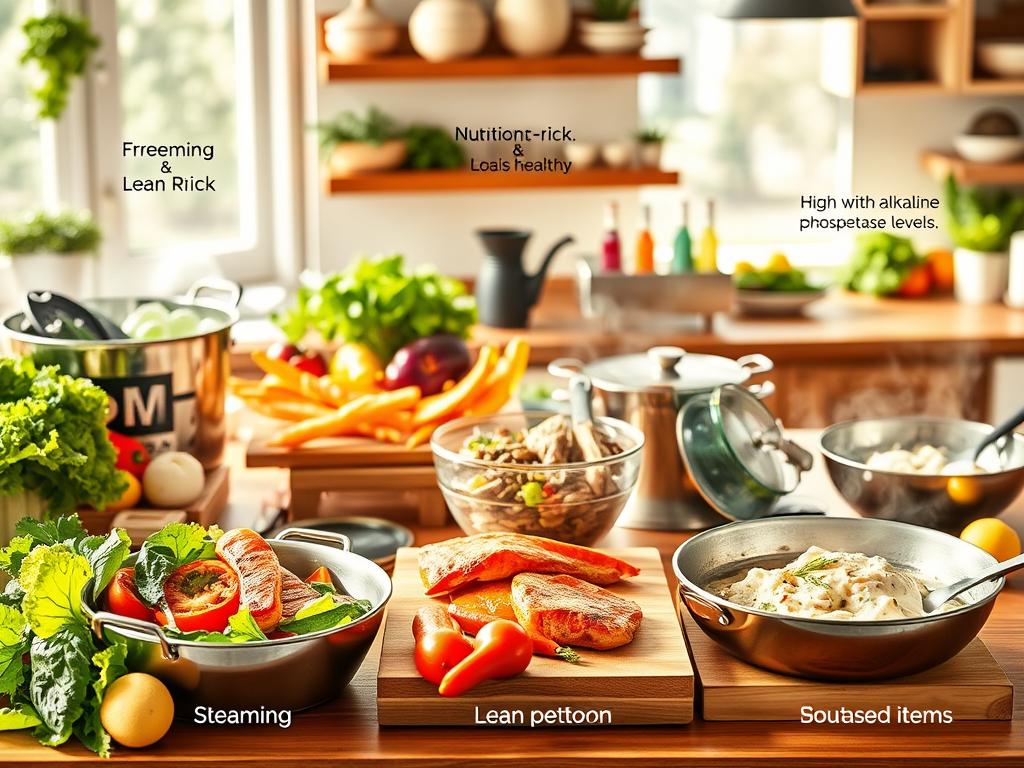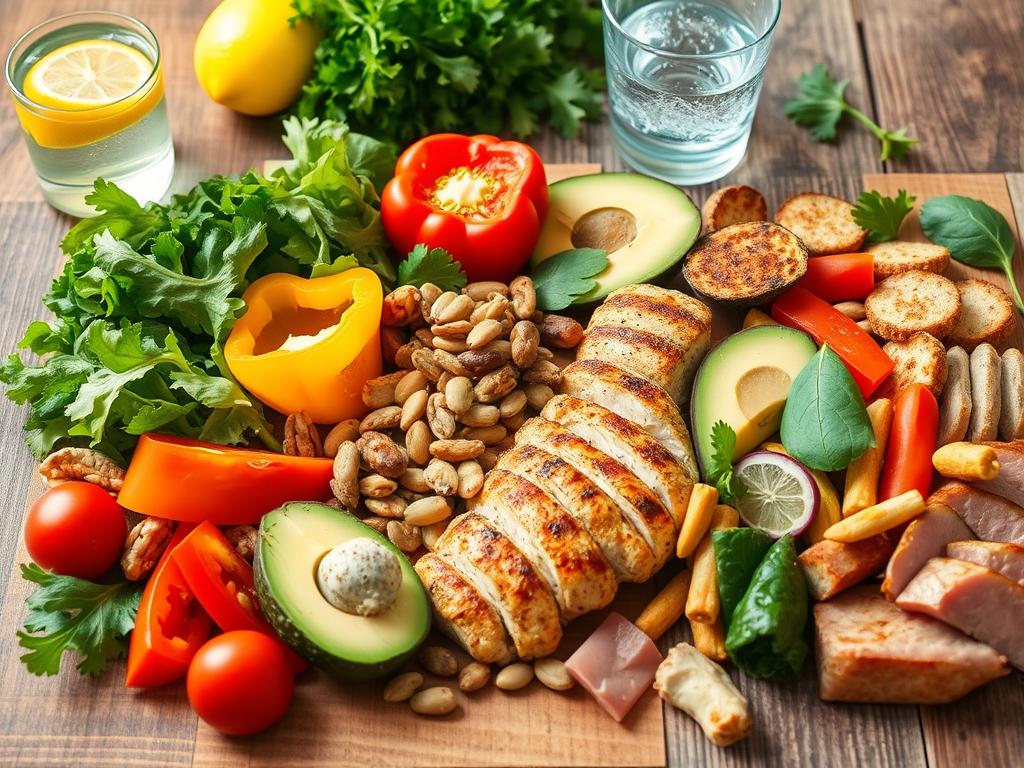Alkaline phosphatase levels are key to our health. Eating right is crucial to manage high levels. Adults should aim for 44-147 IU/L. Knowing what to eat and avoid helps keep levels in check.
Foods that support liver health are important. Avoiding foods that raise levels is also key. A balanced diet is essential.
Research shows that diet affects alkaline phosphatase levels. Omega-3 fatty acids can lower levels in people with certain diseases. Drinking coffee also helps, with more than three cups a day showing the biggest benefits.
Managing high alkaline phosphatase needs a full plan. This includes diet and lifestyle changes.
Knowing how diet affects alkaline phosphatase helps us make better choices. A well-chosen diet can reduce risks and improve health. This article will guide you on the best foods for managing high alkaline phosphatase. It’s all about supporting your liver and overall health through food.
Understanding Alkaline Phosphatase and Its Role in Your Body
Alkaline phosphatase (ALP) is an enzyme found in the liver, bones, kidneys, and digestive system. It helps break down phosphate monoesters. This frees up phosphate for the body’s functions. An alkaline phosphatase test checks ALP levels in the blood. It helps find liver or bone problems. Normal levels are between 44-147 IU/L or 30-120 IU/L.
High ALP levels can mean liver disease, bone issues, or other health problems. An alkaline phosphatase blood test diet might be suggested to control ALP. Foods like fat, fried, and processed can increase ALP. But, zinc, phosphorus, and Vitamin B12 can also raise it. Eating well and staying active is key to keeping ALP levels right.
Knowing how ALP works in the body is crucial for health. By checking ALP levels with a test and eating right, you can lower liver disease risk. Always talk to a doctor for advice on managing ALP and staying healthy.
Common Causes of High Alkaline Phosphatase Levels
High alkaline phosphatase levels can signal several health issues. These issues fall into three main categories: liver, bone, and other medical conditions. Liver problems like blocked bile ducts, liver cancer, and cirrhosis can raise alkaline phosphatase levels. Bone issues, such as Paget’s disease and fractures, can also cause high levels.
The link between alkaline phosphatase levels and diet is important. Some foods and nutrients can impact alkaline phosphatase levels. For example, eating a lot of fatty foods can increase alkaline phosphatase levels. Drinking coffee might help lower them, but always talk to a doctor first.
High alkaline phosphatase levels can sometimes point to a serious health issue. If your levels are high, seeing a doctor is crucial. They can run more tests to find out why and help you get better. Knowing about the causes and how diet affects alkaline phosphatase levels helps you manage your health.
The Connection Between Diet and Alkaline Phosphatase
Alkaline phosphatase and nutrition are closely linked. Dietary changes can help manage conditions that cause high levels. A balanced diet is key to keeping alkaline phosphatase levels healthy. Research has shown that some foods can affect alkaline phosphatase levels. Knowing how diet and alkaline phosphatase are connected is vital for managing this enzyme.
High alkaline phosphatase and nutrition are connected. A healthy diet can ease symptoms of high alkaline phosphatase levels. For example, foods rich in omega-3 fatty acids and fruits can reduce inflammation and improve health. Also, avoiding foods that trigger inflammation, like fried foods and sugary drinks, can help manage high levels.
For specific dietary advice, eating more foods rich in magnesium and vitamin D supports bone health and lowers alkaline phosphatase levels. Drinking plenty of water also helps flush out toxins and promotes health. By choosing the right foods, individuals can actively manage their alkaline phosphatase levels and improve their overall well-being.
Foods to Avoid if Alkaline Phosphatase is High
High alkaline phosphatase levels mean you need to watch what you eat and drink. Alkaline phosphatase foods to avoid include alcohol, which stresses the liver. High-fructose diets can also lead to fatty liver disease, raising ALP levels.
Knowing what foods to avoid if alkaline phosphatase is high helps manage the condition. It prevents further problems.
Some foods can increase alkaline phosphatase levels. It’s important to limit or avoid them. Foods that raise alkaline phosphatase include high-fructose corn syrup, sugary drinks, and processed foods.
These can damage the liver and cause inflammation. This leads to higher ALP levels. Knowing which foods to avoid helps make better dietary choices.
Staying away from certain foods can help with high alkaline phosphatase symptoms. By changing your diet and avoiding what foods to avoid if alkaline phosphatase is high, you can lower your risk of complications. It’s key to talk to a healthcare professional for tailored dietary advice.
Beneficial Foods That May Help Lower Alkaline Phosphatase
Managing high alkaline phosphatase levels can be easier with the right foods. Foods rich in omega-3 fatty acids, like salmon, may help lower alkaline phosphatase levels. Moderate coffee drinking has also been linked to lower alkaline phosphatase levels in some studies.
Foods high in antioxidants and fiber are also good. These include fruits, vegetables, and whole grains. Remember, while these foods are helpful, a balanced diet is key. Always talk to a healthcare professional before changing your diet.
Eating foods rich in omega-3 fatty acids, like salmon, is a great choice. Foods high in vitamin D, like fortified dairy and mushrooms, are also beneficial. Adding these to your diet can help decrease alkaline phosphatase levels. This can also lower the risk of related health issues.
The Role of Vitamins and Minerals
Alkaline phosphatase levels can be affected by diet and nutrient intake. Vitamin D supplements may help lower ALP levels. Also, getting enough zinc and magnesium is key, as low levels are linked to low alkaline phosphatase.
Food intolerances can also affect alkaline phosphatase levels. It’s important to identify and manage any sensitivities. By understanding the link between alkaline phosphatase and food intolerances, people can lower alkaline phosphatase through diet. This might mean avoiding certain foods and eating nutrient-rich foods.
Eating a balanced diet with whole foods can help keep alkaline phosphatase levels healthy. Focusing on nutrient-dense foods and being aware of food intolerances is important. This way, individuals can manage their alkaline phosphatase levels and overall health.
Remember, how to lower alkaline phosphatase through diet can differ for everyone. Getting advice from a healthcare professional or registered dietitian is crucial. They can offer personalized guidance on managing alkaline phosphatase levels and addressing health concerns.
Liver-Supporting Foods and Their Benefits
Diet is key when managing alkaline phosphatase levels. Eating right can boost liver health, which affects alkaline phosphatase levels. Foods packed with antioxidants, fiber, and healthy fats are great for the liver. For example, spinach and kale help the liver stay healthy, which can lower alkaline phosphatase levels.
Broccoli and cauliflower are also good for the liver. They have compounds that fight off liver toxins. This reduces inflammation and keeps the liver working well. Adding these foods to your diet is a smart move for your health.
Nuts like walnuts and olive oil are also beneficial. They’re full of healthy fats and antioxidants. Berries, such as blueberries and cranberries, are rich in antioxidants too. They protect liver cells from harm. Eating these foods and following alkaline phosphatase and dietary restrictions can improve liver health and overall well-being.
Meal Planning Strategies for High Alkaline Phosphatase
Managing high alkaline phosphatase levels starts with a well-planned diet. High alkaline phosphatase food recommendations include fruits, vegetables, whole grains, and lean proteins. A balanced diet supports liver health and helps regulate alkaline phosphatase levels.
It’s important to know which foods to avoid. Alkaline phosphatase levels and food to avoid include high-sugar and high-fructose foods, as well as refined carbohydrates. Cutting down on these can ease liver pressure and improve digestion. Also, reducing processed meat and alcohol intake is key for liver health.
Eating liver-friendly foods like fruits, vegetables, lean proteins, and whole grains supports liver health. Drinking enough water is also vital for liver function and detox.
By following these strategies and making smart food choices, you can manage high alkaline phosphatase levels. Remember, everyone’s nutritional needs are different. Getting advice from a healthcare professional or registered dietitian can help create a meal plan that fits your needs.
Impact of Cooking Methods on Enzyme Levels
Cooking methods can greatly affect alkaline phosphatase levels. Choosing the right way to cook can help. Steaming keeps nutrients in, while deep frying adds harmful stuff. It’s key to pick foods wisely to keep your diet balanced.
A study on rabbits showed that bad cooking oils raise liver enzymes and MDA levels. This shows the need for good cooking oils and methods. But, using oils just once didn’t harm liver function, showing cooking matters for food’s value.

Using healthy cooking like steaming or grilling keeps nutrients in and out harmful stuff. Knowing how cooking affects alkaline phosphatase helps make better food choices. This keeps your diet balanced and boosts your health.
Hydration and Its Effect on Alkaline Phosphatase
Drinking enough water is key for health and helps the liver work better. It helps remove toxins and keeps enzyme levels balanced. Some studies show that drinking coffee in moderation can lower alkaline phosphatase levels. But, eating foods that raise alkaline phosphatase should be done carefully, as they can harm the liver.
Hydration is vital for a healthy liver. The liver filters out toxins, and water helps it do this job. Research also points out that omega-3 fatty acids can lower intestinal alkaline phosphatase, while omega-6 fatty acids can raise it. Knowing how different foods and drinks affect alkaline phosphatase levels can guide better diet choices.
For staying hydrated, water is the top choice. Herbal teas and low-sugar juices can also be good. But, it’s important to avoid sugary drinks and alcohol, as they can harm the liver. By choosing wisely what to drink and eat, we can support our health and keep alkaline phosphatase levels in check.
Lifestyle Factors That Influence Alkaline Phosphatase
Keeping alkaline phosphatase levels in check is more than just about what you eat. Your lifestyle, including exercise, stress levels, and sleep, also matters a lot. For example, working out can help lower ALP levels in your bones. But, too much stress and not enough sleep can harm your liver and raise ALP levels.
Staying active, eating right, and getting enough sleep are key to good health and managing high alkaline phosphatase. Also, cutting down on alcohol, quitting smoking, and avoiding obesity can help keep ALP levels in check. Omega-3 fatty acids have also been shown to lower ALP levels in some health conditions.
It’s important to know that alkaline phosphatase levels can be affected by many things, including your lifestyle. By choosing healthy foods, exercising regularly, and managing stress, you can help control high alkaline phosphatase. Adopting a healthy lifestyle and being aware of what affects ALP levels can lower your risk of health problems.
Monitoring Your Diet’s Effect on Alkaline Phosphatase
Keeping an eye on ALP levels through alkaline phosphatase blood test diet is key. It shows how diet and lifestyle changes work. By using a food diary and getting help from doctors, you can see which foods affect your ALP levels. For example, some foods and supplements can change how ALP works in your body.
Research shows that drinking coffee daily can lower ALP levels. People who drink two to three cups a day see a drop. Omega-3 fatty acids in supplements also lower ALP after twelve weeks. Adults can try foods like lentils and sunflower seeds to help control ALP levels.

It’s crucial to work with doctors to create a plan for ALP levels. By making diet changes and checking ALP levels regularly, you learn how your diet affects you. This way, you can make smart choices for your health. It helps those with high ALP levels make better food choices, leading to better health.
Special Dietary Considerations for Different Conditions
Managing high alkaline phosphatase levels requires a special diet. The diet needed can change based on why ALP is high. For example, people with liver disease might eat more carbs and less fat, with careful protein.
This helps because liver issues can mess with alkaline phosphatase levels. A diet made just for them can ease symptoms.
For bone problems like Paget’s disease, diet and restrictions are key. Eating foods that help bones, like calcium and vitamin D, is important. Also, staying active and avoiding falls can help prevent problems.
High alkaline phosphatase levels can come from many things, like age or health history. So, a diet and lifestyle plan that fits you is crucial. Knowing why ALP is high and choosing the right foods can help improve health.
In short, a high alkaline phosphatase diet and knowing about alkaline phosphatase and dietary restrictions are key. Tailoring your diet to your health needs can help manage symptoms and improve life quality.
Creating a Sustainable Meal Plan
Managing alkaline phosphatase through diet requires lasting changes. A good meal plan helps keep your alkaline phosphatase levels healthy. Start by adding foods like omega-3 seafood, fiber-rich oats and lentils, and berries and leafy greens to your diet.
Eating a balanced diet is key to lowering liver fat and keeping your liver healthy. Avoid foods high in refined sugars, fructose, and unhealthy fats. Also, cut down on alcohol. Eating whole grains, legumes, and fiber can help prevent fatty liver disease.
Changing your diet should be done slowly. This way, you can stick to your plan and make lasting changes. By following these tips and eating foods high in alkaline phosphatase, you can manage your levels and support your liver health.
Conclusion: Managing High Alkaline Phosphatase Through Diet
There’s no one food fix for high alkaline phosphatase levels. But, choosing the right foods can help a lot. Avoiding processed foods, too much alcohol, and saturated fats is key. Instead, eat foods rich in nutrients like dairy, fish, eggs, nuts, seeds, and leafy greens.
This can help your liver and bones stay healthy. It might even lower your alkaline phosphatase levels.
Adding regular exercise, managing stress, and drinking plenty of water can also help. But, if your levels stay high and you’re feeling bad, see a doctor. They can give you advice and treatment that’s right for you.






Leave a Reply
View Comments